Table of Contents
The way companies choose flight options for their employees has changed a lot in recent years. More businesses are taking a closer look at the real value of business class vs economy class travel, especially for their staff who fly often. This shift comes from understanding that the right travel choice can affect both employee well-being and work results.
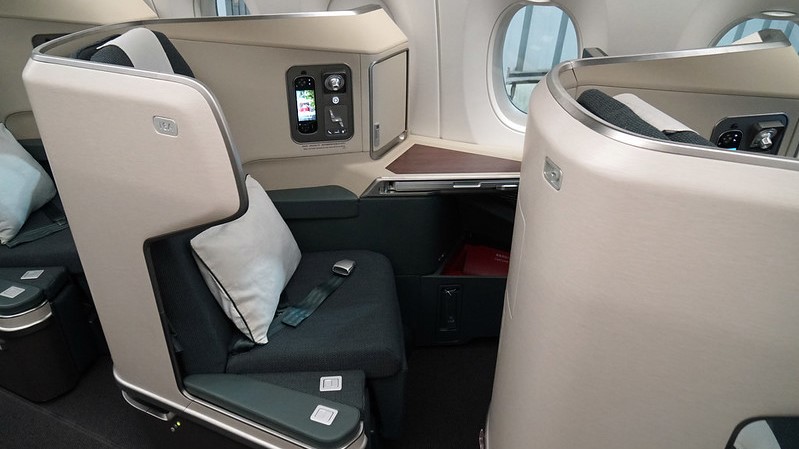
For corporate travelers who spend many hours in the air, the difference between seat classes goes beyond just comfort. It’s about staying productive, arriving ready to work, and making the most of travel time.
While economy class has long been the default choice for many companies watching their budgets, the trend toward premium travel options is growing stronger.
Companies are now weighing the full picture when booking flights. They’re looking at:
- How well employees can work during flights
- Whether staff arrive fresh and ready for meetings
- The impact on employee satisfaction and retention
- The total cost versus potential benefits
This shift in thinking reflects a broader change in how businesses view travel expenses. Instead of seeing flight upgrades as just another cost, many companies now view them as an investment in their people and their business results.
For frequent flyers who cross time zones and head straight to important meetings, the choice between business and economy class can make a real difference. Understanding these differences helps both companies and their traveling employees make better decisions about which option suits their needs and goals.
What’s Different? A Clear Look at Business and Economy Class Features
The most noticeable difference between business class vs premium economy starts with the seat itself. Business class seats are significantly wider, giving travelers more freedom to move and work comfortably.
While economy offers about 31-32 inches of legroom, business class passengers enjoy 55-75 inches, making it possible to stretch out or even lie flat on long flights.
Many business class seats convert into beds, often in private pods with dividers, making rest much easier during long journeys.
Service That Makes a Difference
When comparing first class vs business class to economy, service quality stands out clearly. Business class cabins have more flight attendants per passenger, leading to faster, more personal service. Flight attendants greet you by name, anticipate your needs, and respond quickly to requests.
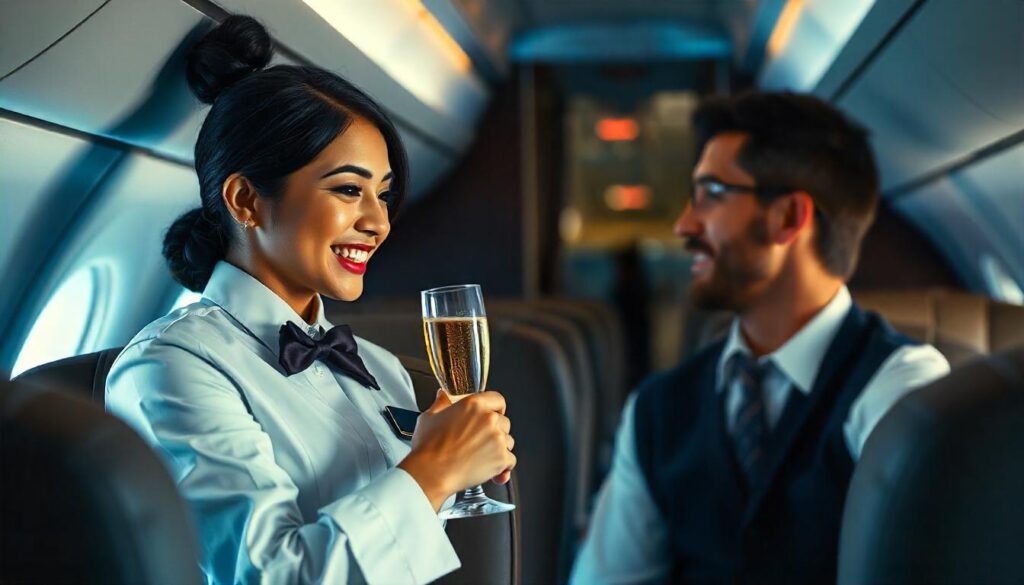
They’re available to help store bags, keep drinks refilled, and ensure a smooth journey. In contrast, economy class flight attendants, while professional, must serve many more passengers, resulting in more basic, less personal service.
Better Meals and Drinks
The dining experience varies dramatically between classes. Business class meals rival restaurant quality, served on real plates with metal cutlery instead of plastic. Passengers can choose from premium wines and spirits, with snacks available throughout the flight.
Special meal requests receive more attention and flexibility. Economy meals, while adequate, are simpler with fewer choices and basic presentation. They’re typically served all at once with standard beverage options.
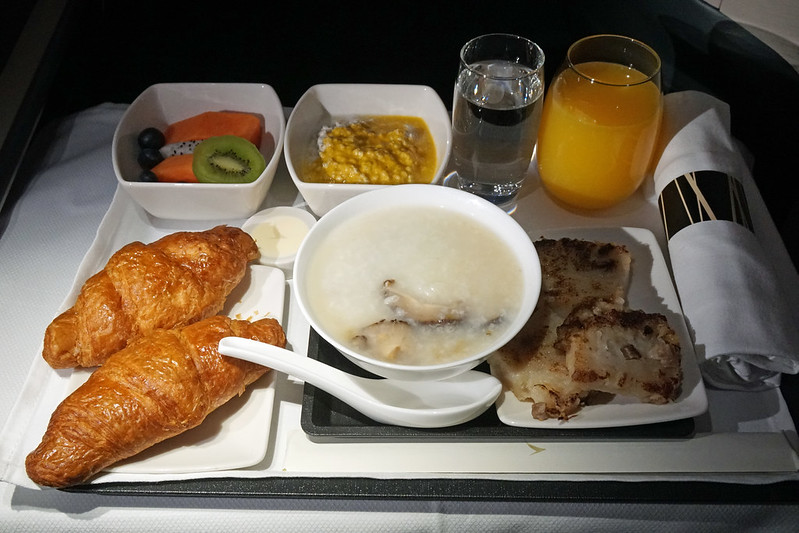
Extra Benefits That Matter
The differences between economy premium vs business class extend beyond the flight itself. Business class travelers enjoy access to airport lounges, offering quiet spaces to work or relax before flights.
They move through airports more efficiently with priority check-in, security screening, and boarding. Higher baggage allowances and fast-track immigration at some airports save valuable time and reduce travel stress.
Entertainment and Work Features
Both classes offer entertainment, but business class provides a superior experience with larger personal screens and better noise-canceling headphones.
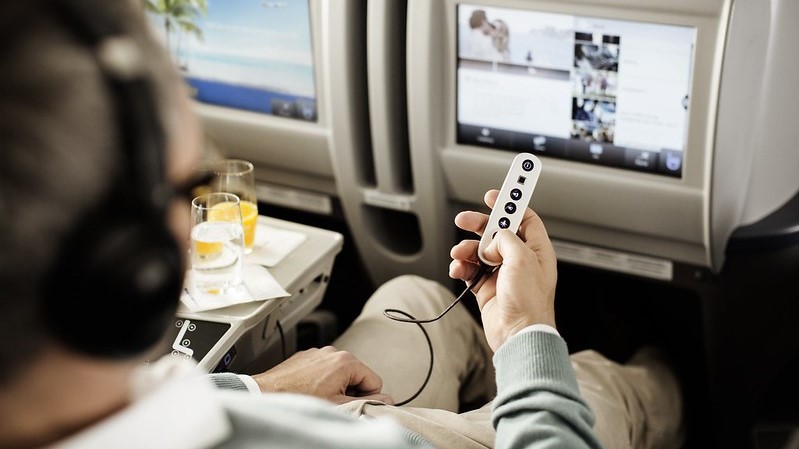
The entertainment selection is usually more extensive, and every seat has its own power outlet. While economy also offers entertainment, the systems are typically more basic with smaller screens and fewer options.
Getting Work Done
For corporate travelers, the ability to work during flights can be crucial. Business class provides an environment more conducive to productivity, with ample space for laptops and better lighting for reading.
The quieter, more private setting makes it easier to handle confidential work or join online meetings when Wi-Fi is available. Economy’s limited space can make working challenging, particularly when surrounding passengers recline their seats.
The Impact on Business Travel
These differences significantly affect how well corporate travelers can use their time in the air. Business class travelers often arrive more rested after overnight flights and better prepared for meetings.
The extra comfort and space help maintain productivity during travel time, while the enhanced service and amenities help travelers maintain a professional appearance and mindset. While economy class remains suitable for shorter trips, the benefits of business class become more valuable on longer flights or when heading directly to important meetings.
Is Business Class Worth the Extra Money?
The cost difference between economy and business class can be significant. Pricing comparison for first class and business class tickets shows that business class often costs 3-5 times more than economy.
For example, a round-trip economy ticket from New York to London might cost $800, while business class on the same route could range from $3,000 to $5,000. These differences vary based on routes, airlines, and booking times.
Making Sense of the Value
When asking is first class worth the extra cost over business class, companies need to consider several factors:
- Time and Productivity: Business travelers can work more effectively during flights in business class. A six-hour flight in business class might provide four to five productive hours, compared to one or two in economy. This extra productive time can help offset the higher ticket cost, especially for high-value employees whose time is particularly valuable.
- Physical Well-being: Long flights in economy class can leave travelers tired and stiff. Business class passengers often arrive more refreshed and ready for work. This benefit becomes more important when travelers need to attend meetings shortly after landing or when trips involve multiple flights.
- Schedule Flexibility: Business class tickets often offer more flexible booking terms and better options for flight changes. This flexibility can save money when travel plans change suddenly, as change fees are often lower or waived entirely.
Smart Ways to Save
Using a business class consolidator can help reduce costs significantly. These specialists often offer business class tickets at 20-40% below regular prices. Other money-saving strategies include:
- Loyalty Programs: Corporate frequent flier programs can provide significant savings through upgrades and reward tickets. Many companies accumulate points across all employee travel, leading to valuable redemption opportunities.
- Advance Booking: Business class fares often drop significantly when booked several months ahead. While last-minute business class tickets can be extremely expensive, early bookings might cost only twice the economy fare instead of four or five times more.
- Corporate Agreements: Large companies can negotiate special rates with airlines, reducing the premium for business class travel. These agreements might include fixed discounts, upgrade vouchers, or special fares on specific routes.
When It Makes Most Sense
The value of business class becomes clearer in certain situations:
- For long-haul flights over six hours, especially overnight trips
- When meetings are scheduled shortly after landing
- During multi-city trips where rest between flights is important
- For senior executives whose time is particularly valuable
- When negotiating important deals or presenting to clients
Measuring Return on Investment
Companies can measure the value of business class travel by considering:
- The cost difference between ticket classes
- The value of productive time gained during the flight
- The impact on meeting performance and deal outcomes
- Employee satisfaction and retention benefits
- Reduced recovery time needed after travel
While the higher cost of business class is significant, many companies find the investment worthwhile when used strategically. The key is developing clear policies about when business class travel makes sense and when economy class is more appropriate.
The Complete Travel Experience: From Airport to Destination
Benefits of flying first class vs business class begin the moment travelers reach the airport. Business class passengers skip long check-in lines, using dedicated counters where staff handle their arrangements quickly and efficiently.
Priority security lanes save valuable time, while dedicated passport control channels in many airports help streamline the departure process.
Airport lounges transform pre-flight waiting time into productive hours. Unlike the busy terminal experience economy passengers face, business travelers enjoy quiet spaces with comfortable seating, reliable internet, and quality refreshments.
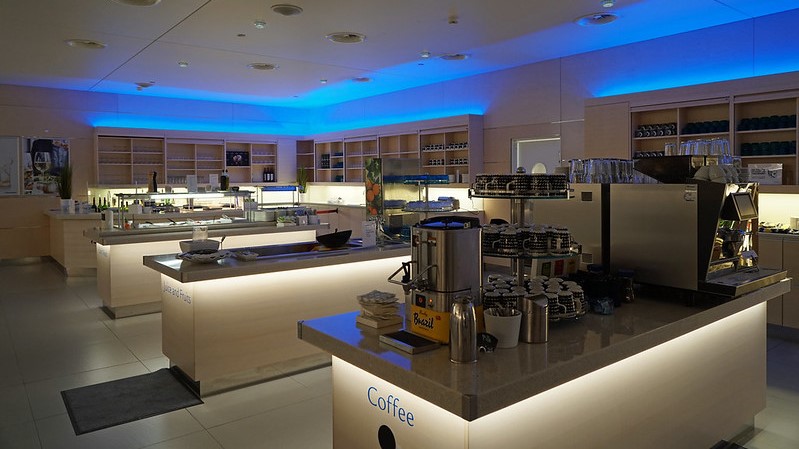
Many lounges offer shower facilities, meeting rooms, and even spa services, making early arrival at the airport a pleasure rather than a burden.
The Flight Experience
What to expect in first class compared to business class? reveals significant differences in comfort and service. Business class cabins feel notably calmer and more spacious.
Flight attendants greet passengers by name, offering welcome drinks and helping with settling in. The atmosphere encourages relaxation or work, depending on the traveler’s preference.
Meal service stands out as a major upgrade. Rather than the standard economy timing and limited choices, business travelers enjoy restaurant-quality dining on their own schedule.
Multiple courses, premium beverages, and attentive service make meals a highlight rather than just a necessity. Fresh snacks and drinks remain available throughout the flight.
Working or Resting: Your Choice
The business cabin design prioritizes passenger comfort and flexibility. Wide, adjustable seats convert into fully flat beds on long flights.
Quality bedding, noise-canceling headphones, and adjustable lighting help create ideal conditions for rest. Many travelers report getting several hours of genuine sleep, especially on overnight flights.
For those choosing to work, the environment proves equally accommodating. Spacious tables, power outlets, and ample personal space make laptop work comfortable. The quieter cabin and greater privacy allow for focused work time or confidential phone calls when Wi-Fi is available.
Landing Ready for Business
According to first class vs business class reviews from travelers, the true value of premium travel often becomes most apparent after landing.
Business class passengers typically emerge more refreshed and alert, ready to head straight into meetings. Priority baggage handling and fast-track immigration at many destinations further reduce travel stress and save time.
This improved arrival experience translates directly into business performance. Travelers who rest properly during their flight demonstrate:
- Better concentration during meetings
- More effective decision-making abilities
- Higher energy levels throughout the day
- More professional presentation
- Greater confidence in client interactions
The Economy Difference
By comparison, economy travelers often face more challenges. Limited seat recline and less personal space make rest difficult. Working proves challenging when space is tight, especially if surrounding passengers recline their seats.
The more crowded environment and basic service level can leave travelers feeling tired and unprepared for business activities.
Impact on Business Success
The quality of travel experience directly affects business outcomes. Well-rested travelers perform better in negotiations, maintain clearer focus during presentations, and represent their companies more effectively.
For meetings scheduled shortly after arrival, the difference between arriving refreshed or exhausted can significantly impact results.
Long-term Benefits
Beyond immediate comfort, premium travel affects overall job satisfaction and performance. Regular business travelers often report:
- Reduced travel fatigue
- Better work-life balance
- Increased productivity during travel
- Higher job satisfaction
- Greater willingness to travel when needed
This combination of benefits helps explain why many companies view business class travel as an investment rather than an expense, particularly for long-haul flights or trips with tight schedules.
The improved experience translates into better business results and more effective use of valuable employee time.
Making Informed Travel Choices: The Bottom Line
Corporate travel decisions require careful balancing of comfort, productivity, and cost. The extensive comparison between travel classes reveals that both business and first class offer significant advantages over economy, particularly for long-haul flights and important business trips.
Business class emerges as the practical choice for most corporate travelers, providing:
- Comfortable lie-flat seats for proper rest
- Productive work environments
- Quality dining and service
- Priority airport processing
- Lounge access and pre-flight comfort
While first class adds another layer of luxury and exclusivity, the additional cost often exceeds the marginal benefits for business purposes. Business class typically delivers the essential elements needed for productive corporate travel at a more reasonable price point.
When choosing between classes, consider:
- Flight duration and timing
- Meeting schedules upon arrival
- Company budget and policies
- Route importance and frequency
- Employee seniority and role
The investment in premium travel often pays dividends through improved performance, better-rested employees, and increased productivity. However, each organization must determine its own balance point between travel comfort and cost effectiveness.
For most corporate travelers, business class represents the optimal compromise between luxury and practicality. It provides the necessary tools and comfort for successful business travel while maintaining reasonable cost control.
As airlines continue to enhance their business class products, this sweet spot becomes even more attractive for corporate travel programs focused on both employee well-being and fiscal responsibility.
FAQs about First Class vs Business Class
As corporate travelers weigh their options between premium cabins, many questions arise about the differences, value, and experience of each class. Here are detailed answers to the most common questions about first class and business class travel.
What are the main differences between first class and business class?
First class offers more personal space, ultra-personalized service with higher staff-to-passenger ratios, and exclusive dining options. Business class provides lie-flat seats, good service, and premium dining, but with less exclusivity. First class may include private suites on some airlines, while business class typically offers pod-style seating.
Is it worth paying for first class over business class?
For most corporate travelers, the additional cost of first class over business class doesn’t justify the incremental benefits. Business class provides the essential comfort and service needed for productive travel. First class may be worth considering for ultra-long-haul flights or when privacy is paramount.
What amenities are included in first class that are not in business class?
First class typically includes:
Larger personal suites or spaces
Premium champagne and rare wines
À la carte dining anytime
Designer amenity kits
Exclusive lounge access
Chauffeur service at some airports
Personal concierge services
Can you upgrade from business class to first class easily?
Upgrades can be challenging due to limited first class seats. Options include:
Using frequent flyer miles
Upgrade bidding programs
Corporate upgrade certificates
Last-minute paid upgrades
Success often depends on availability and loyalty program status.
How much more expensive is first class compared to business class?
First class typically costs 30-50% more than business class. For example, a $5,000 business class ticket might cost $7,500-9,000 in first class on the same route. The price difference varies by airline and route.
Are there significant comfort differences between first class and business class?
First class typically costs 30-50% more than business class. For example, a $5,000 business class ticket might cost $7,500-9,000 in first class on the same route. The price difference varies by airline and route.
What do travelers say about their experiences in first class versus business class?
Most travelers report excellent experiences in both classes. First class receives praise for exceptional service and privacy, while business class travelers highlight the good value proposition and sufficient comfort for business needs.
Which airlines offer the best first class and business class services?
Top-rated airlines for premium travel include:
Emirates
Singapore Airlines
Qatar Airways
ANA
Cathay Pacific
Each excels in different aspects of premium service.
How does the boarding process differ between first class and business class?
Both classes enjoy priority boarding, with first class typically boarding first. Both receive priority check-in and security access. First class may offer additional services like private terminal access or escort services at some airports.
What factors should I consider when choosing between first class and business class?
Key considerations include:
Flight duration
Budget constraints
Company policy
Route importance
Need for privacy
Meeting schedules
Upgrade availability
Airline loyalty program benefits








